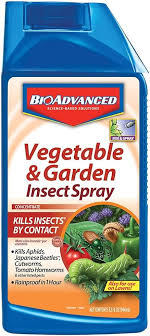Safe Insecticide for Your Vegetable Garden
When it comes to protecting your vegetable garden from pests, using insecticides can be an effective solution. However, many conventional insecticides contain harmful chemicals that can be detrimental to both your health and the environment. Fortunately, there are safe alternatives that can help you control pests without compromising safety.
Natural Oils
Natural oils such as neem oil, peppermint oil, and garlic oil are effective insecticides that are safe to use in your vegetable garden. These oils work by suffocating and repelling pests while being non-toxic to humans, pets, and beneficial insects.
Diatomaceous Earth
Diatomaceous earth is a natural powder made from fossilized algae that can effectively control pests like aphids, slugs, and beetles. It works by dehydrating insects upon contact and is safe to use around vegetables.
Soap Sprays
Soap sprays made from biodegradable soaps are another safe option for controlling insect pests in your vegetable garden. These sprays disrupt the cell membranes of insects, causing them to dehydrate and die. Just make sure to use mild soap solutions to avoid harming your plants.
Bacillus Thuringiensis (Bt)
Bacillus thuringiensis (Bt) is a naturally occurring bacterium that targets specific pests like caterpillars and larvae. It is safe for humans, animals, and beneficial insects but effectively controls harmful pests in your vegetable garden.
Conclusion
Protecting your vegetable garden from pests doesn’t have to come at the cost of safety. By opting for safe insecticides like natural oils, diatomaceous earth, soap sprays, and Bt, you can effectively control pests while maintaining a healthy environment for yourself and your plants.
7 Essential Tips for Using Safe Insecticides in Your Vegetable Garden
- Choose insecticides labeled as safe for use in vegetable gardens.
- Read and follow the instructions on the insecticide label carefully.
- Apply insecticides during calm weather to prevent drift.
- Avoid spraying insecticides when pollinators are active, such as bees.
- Use protective gear like gloves, mask, and goggles when applying insecticides.
- Store insecticides in their original containers out of reach of children and pets.
- Properly dispose of empty insecticide containers following local regulations.
Choose insecticides labeled as safe for use in vegetable gardens.
When selecting insecticides for your vegetable garden, it is crucial to prioritize safety by choosing products that are specifically labeled as safe for use in vegetable gardens. Opting for insecticides with this designation ensures that they have been formulated and tested to be effective against pests while posing minimal risk to your plants, yourself, and the environment. By following this tip, you can protect your vegetable garden from harmful insects without compromising the safety of your produce or the ecosystem in which it grows.
Read and follow the instructions on the insecticide label carefully.
To ensure the safe and effective use of insecticides in your vegetable garden, it is crucial to read and follow the instructions on the insecticide label carefully. The label provides important information on proper application methods, dosage, safety precautions, and potential hazards. By adhering to the instructions, you can maximize the benefits of the insecticide while minimizing any risks to yourself, your plants, and the environment. Remember that responsible use of insecticides is key to maintaining a healthy and thriving garden ecosystem.
Apply insecticides during calm weather to prevent drift.
When using insecticides in your vegetable garden, it is essential to apply them during calm weather to prevent drift. Applying insecticides on a calm day ensures that the spray stays on target and does not get carried away by wind, potentially affecting unintended areas or harming beneficial insects. By choosing the right weather conditions for application, you can maximize the effectiveness of the insecticide while minimizing any risks to the surrounding environment.
Avoid spraying insecticides when pollinators are active, such as bees.
To ensure the safety of pollinators like bees in your vegetable garden, it is important to avoid spraying insecticides when they are active. Bees play a crucial role in pollinating plants, including many of the vegetables in your garden. By timing your insecticide applications when pollinators are not active, such as early in the morning or late in the evening, you can protect these beneficial insects while effectively managing pests. This simple practice not only safeguards the health of bees but also helps maintain a balanced and thriving ecosystem in your garden.
Use protective gear like gloves, mask, and goggles when applying insecticides.
When applying insecticides in your vegetable garden, it is crucial to prioritize safety by using protective gear such as gloves, a mask, and goggles. These items act as a barrier between you and the insecticide, reducing the risk of exposure to potentially harmful chemicals. Wearing gloves protects your skin from direct contact with the insecticide, while a mask helps prevent inhalation of fumes or particles. Goggles shield your eyes from any splashes or sprays during application, ensuring that you can effectively control pests while safeguarding your health. By taking these simple precautions, you can create a safer environment for yourself and promote responsible pesticide use in your garden.
Store insecticides in their original containers out of reach of children and pets.
It is crucial to store insecticides in their original containers and keep them out of reach of children and pets. By storing these products properly, you can prevent accidental exposure and ensure the safety of your loved ones. Placing insecticides in a secure location not accessible to children or pets helps minimize the risk of ingestion or contact, maintaining a safe environment for everyone in your household.
Properly dispose of empty insecticide containers following local regulations.
It is crucial to properly dispose of empty insecticide containers following local regulations to ensure the safe handling and disposal of potentially harmful chemicals. By adhering to proper disposal guidelines, you can prevent environmental contamination and protect both human health and ecosystem integrity. Be sure to check with your local waste management authorities for specific instructions on how to dispose of empty insecticide containers in a responsible and environmentally friendly manner.

